- School Info
- Parents & Carers
- Term Dates and School Calendar
- The School Day
- School Uniform
- Mobile Phone and Portable Music Players in School
- Attendance
- Class Charts for Parents
- Homework
- Admissions
- Essential 8 - Ready to learn
- Handbooks for Parents & Pupils
- Letters Home
- Lunch Menu
- Newsletters
- Online Advice (E-Safety)
- Parent View
- Safeguarding
- Personal Development
- Work Experience
- Year 7 Parent Event
- Progress Reports
- Cost of Living Support
- Hillside Pantry
- Team Around The School
- Curriculum
- Pupils
- Calendar
- News
- Contact
- Statutory Policies
- Job Vacancies
- Train to teach
- Home
- Parents & Carers
- Homework
Homework
Homework at Hillside
At Hillside we are determined to raise achievement and expectations among all our pupils. High quality teaching and learning is critical to pupil’s progress, and appropriately challenging and purposeful homework is a key support to the learning carried out in the classroom. Homework refers to any work or activities which pupils are asked or encouraged to do outside lesson time, either independently or with other adults or pupils. It is important in raising pupil achievement. Not all homework is done at home; in fact, for some pupils who find it hard to work at home, or for some tasks which may require resources (books, software, equipment) more readily available at school, it is necessary or desirable to carry out the task at school. Homework enhances pupil learning, improves achievement and develops pupils study skills and as such is an integral part of the curriculum.
Why is Home Learning so important?
Evidence from the Education Endowment Fund (EEF) shows that, on average, home learning adds five months' additional progress over five years of secondary school. Therefore, to ensure that our pupils make as much progress as possible, it is essential that the homework we set is well planned and purposeful. Learning is a long-term change in memory. When we learn a piece of information, we instantly begin to forget it. We know that over time, the amount of the original information we will retain will be significantly reduced, unless it is revisited often. Our Home learning strategy is designed to allow pupils to frequently revisit powerful knowledge in order to interrupt the forgetting process.
Key Stage Three (Years 7 - 9)
Sparx - Maths /Science and English
All homework for KS3 is set using Sparx.
Sparx assignments are generated using intelligent algorithm tailored to their attainment level and working speed.
Key Stage 4 – Year 10 /11Core homework for pupils in Key Stage 4 is set using Sparx (English, Maths and Science). Class teachers are free to set additional homework where appropriate. This may not always be in the form of a written piece of work or a worksheet but may be more research based. Homework for other subjects will be set using paper based resources or other online platforms. Homework is recorded using class charts. |
Our homework timetable can be accessed through Class Charts by clicking here.
Friday Finish Line
All homework is due in on a Friday.
Parents & carers
section
- Term Dates and School Calendar
- The School Day
- School Uniform
- Mobile Phone and Portable Music Players in School
- Attendance
- Class Charts for Parents
- Homework
- Admissions
- Essential 8 - Ready to learn
- Handbooks for Parents & Pupils
- Letters Home
- Lunch Menu
- Newsletters
- Online Advice (E-Safety)
- Parent View
- Safeguarding
- Personal Development
- Work Experience
- Year 7 Parent Event
- Progress Reports
- Cost of Living Support
- Hillside Pantry
- Team Around The School


